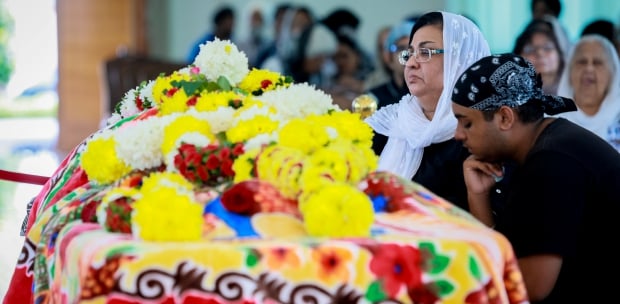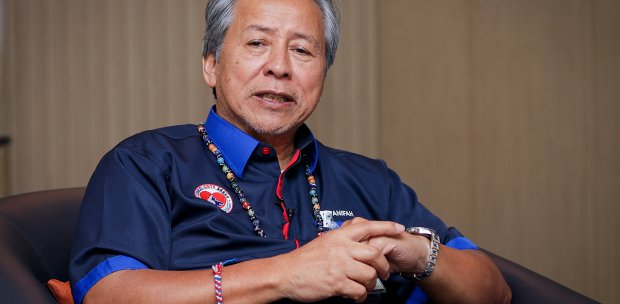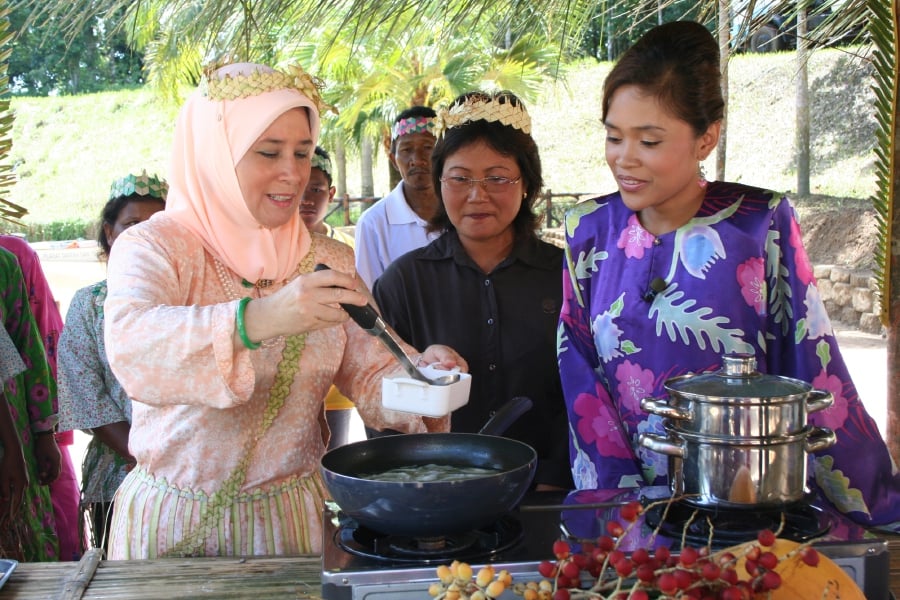
HER eyes glisten. Her voice drops. Tunku Azizah Aminah Maimunah Iskandariah swipes the screen of her handphone with her index finger, looking for the foreword she wrote about her father, where she pays tribute to Almarhum Sultan Iskandar of Johor, for the life lessons he imparted and also for nurturing her love for cooking and food.
She reads an excerpt from it. “Bah told me to learn to cook. He said, “if Azizah doesn’t know how to cook, how would she know if her cooks are not doing it right?” confides Tunku Azizah, recalling one of the reminders that her late father, whom she addresses fondly as ‘Bah’, gave when she was young.
Tunku Azizah, who’s the Tengku Puan Pahang, started to “learn” how to cook at the tender age of six. “I was manja with my nanny, Mak Namah, and spent more of my time with her in the kitchen. I guess that’s when I started my cooking lessons,” she quips.
At the age of 12, she cooked roast turkey with chestnut stuffing for the family. At 13, she was tasked by her mother, Sultanah Zanariah, with the baking of the Johor palace’s special fruitcakes and Raya cookies. By the time she was 16, she was handling the palace’s barbecues for up to 500 people. “I wasn’t forced to do it. I enjoyed it,” she says.
With a gentle smile, she shares that Almarhum Sultan Iskandar also wanted for his guests to the palace to rave about the food that they were served and not so much about how beautiful the palace was. He also reminded her to look after everyone. “Azizah must make sure that the drivers and police personnel are served the same food as the palace guests. “Jaga perut mereka (take care of their stomach),” he’d tell me.”
Tunku Azizah never had any formal chef training although she wished she had. She loved to watch the cooking channels on television. While waiting for the Form Five examination results, Almarhum Sultan Iskandar sent her to the teachers’ training college, Maktab Perguruan Temenggong Ibrahim, of which he was the patron, to learn how to cook.
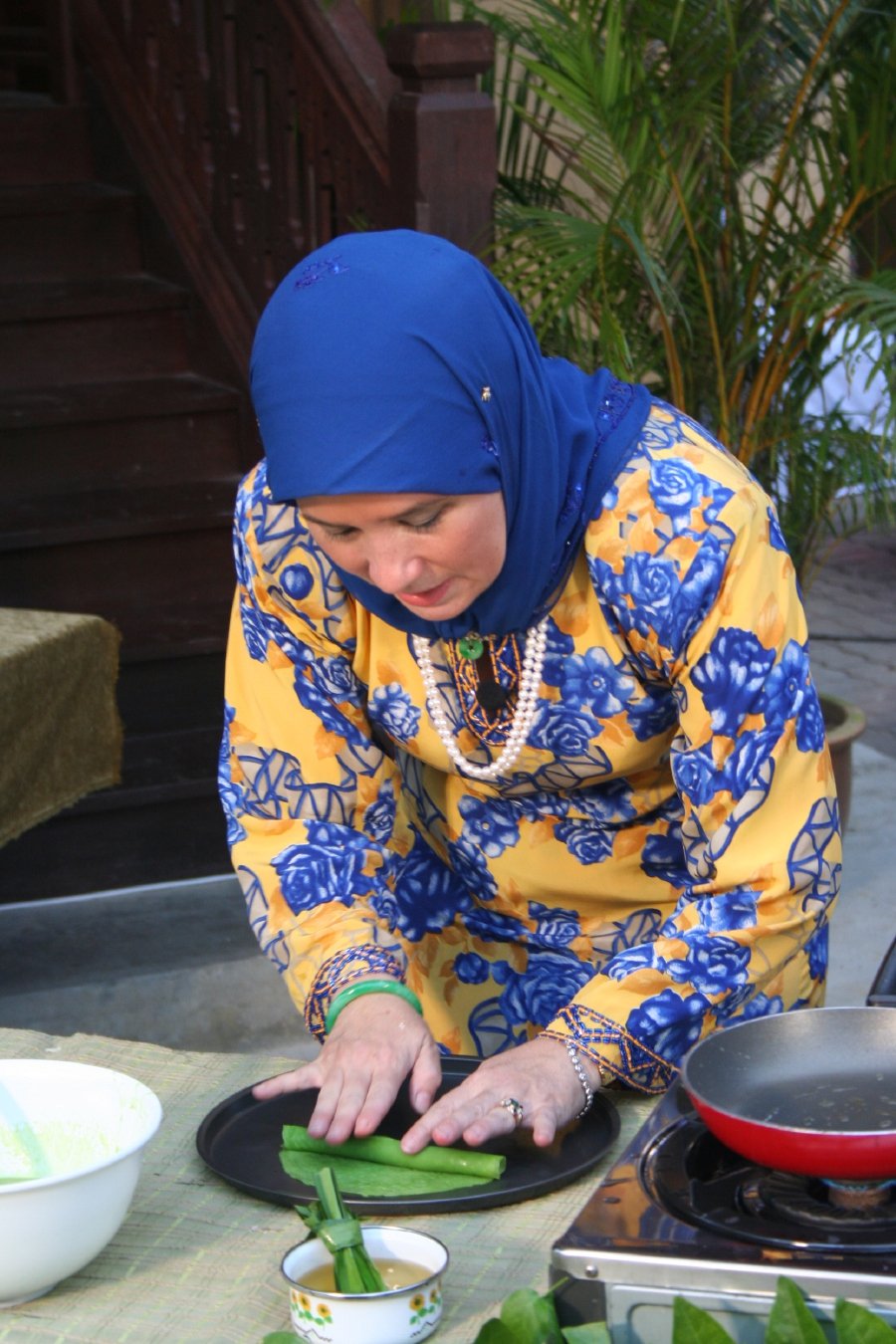
RECIPE OF LOVE
Her eyes dance when she recalls: “I remember being laughed at when I didn’t know how to use the batu giling (grindstone). The onions went flying all over the place. The lecturers sniggered behind my back, saying “tengok tu, anak raja tak boleh mengiling (look, the princess doesn’t know how to do it).” I went home after class and asked the palace cooks to teach me. A day later I returned to show them that this princess could actually do it!”
But if there’s one thing that Tunku Azizah refuses to do to this day, it’s clean fish. “The teacher asked me to do it and I simply refused her. In fact, I asked her to clean it for me. I felt so squeamish.”
While she doesn’t cook as much here, Tunku Azizah does cook up a storm overseas whenever she visits her children who are studying abroad. “I cook every day when I’m there and I cook for everyone, including the household staff and bodyguards.”
True to her father’s reminder, she makes sure that everybody is fed. When she entertains at the palace, she’d ensure that everyone’s served the same food. “If I host a barbecue for 50 people, I always cook for 200 people.”
If there’s one thing that she does really well, it’s sambal belacan. Just ask her friends. In fact, her sambal belacan was also a firm favourite of Singapore’s former Prime Minister, the late Lee Kuan Yew. Smiling, Tunku Azizah recalls: “Lee had written to my father about me but Almarhum never told me. Three days before he passed away, he told my mother that Lee wrote to him. Then Lee wrote to me.” It seems that Tunku Azizah had sent him 21 jars of the sambal belacan along with other local sambal.
And when her children are home from abroad, her dining table will heave with at least six dishes and her children’s favourites. Her husband, The Regent of Pahang, Tengku Abdullah Sultan Ahmad Shah, also prefers home-cooked dishes. “He’d tell me that he wouldn’t want to go out as there’s good food at home,” she confides. In fact, shares Tunku Azizah, her husband would sometimes eat at home first before going for an event or make sure that some food is left for him to eat when he gets home.
“It warms the heart, you know, when your husband and your children tell you that they like your cooking,” says Tunku Azizah, beaming with pride.
She credits her mother for her culinary passion. “Bonda (Sultanah Zanariah) is a good cook. She taught me everything. I remember when I was 9, she said that Zizi (Tengku Azizah’s pet name) will be a good cook one day.”
And Tunku Azizah wouldn’t want to be brought up in any other way. “To have been entrusted with the opportunity to prepare feasts and banquets for the palace guests regardless of who they are has led to my love of cooking and me striving to always be the perfect host and provide the very best,” confides Tunku Azizah, smiling.
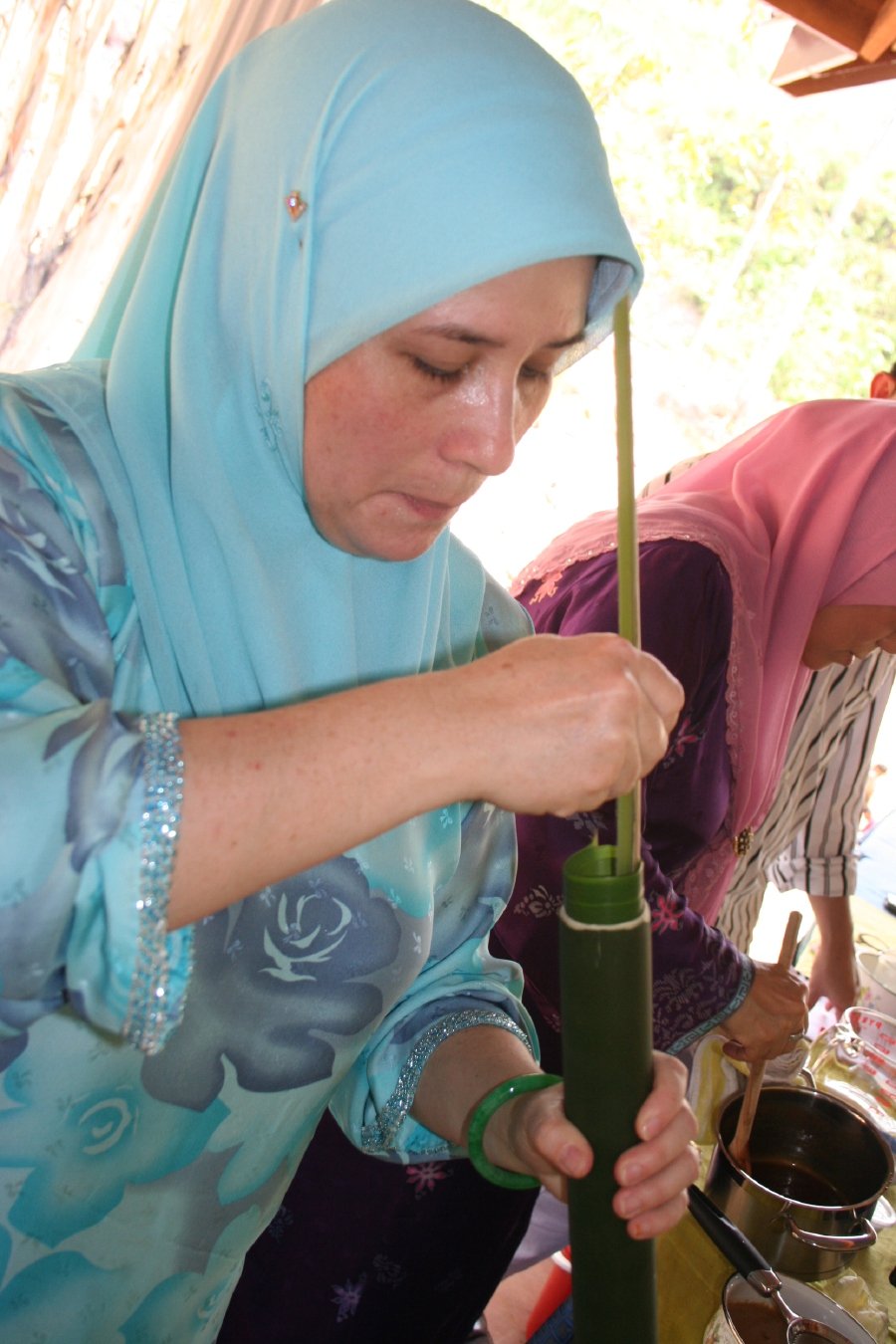
PENNING HER PASSION
Tunku Azizah started collecting recipes at a young age. The old recipe books, some of which are torn and tattered, are kept safe in ziplock bags. “I started collecting recipes and recipe books since I was 9. I make it a point to write down these recipes,” she shares.
Another of her own will today be added onto the book shelf. Her second cookbook, Air Tangan Tengku Puan Pahang — Manisan Tradisional Pahang is a compilation of dessert recipes from the 11 districts of Pahang.
She’ll also launch an updated version of her first book, Air Tangan Tengku Puan Pahang — Masakan Tradisional Pahang, which will have more recipes in it. “I have to be clear about this. These recipes are not mine,” says Tunku Azizah, adding: “They’re traditional recipes from the villages all over Pahang that the womenfolk shared with me. The Pahang Royal Museum and Fama helped me search for these recipes.”
Her first book on local Pahang dishes was launched in 2005. A total of 5,000 copies were printed and sold. She started working on the second book in 2007 but it wasn’t until three years ago that she went full steam to complete it.
The slow progress of the second book was caused by, among others, a neck pain that she suffered while cooking for flood victims, which saw her being admitted into hospital. Also, testing out the dessert recipes took longer than cooking the traditional dishes. Furthermore, the books were in Malay and English. Translating the recipes was time consuming.
Recalls Tunku Azizah: “When I did the first book, we went to three different villages in one day. It was easier where dishes were concerned. We spent about five days in one district and collected between 30 and 50 recipes per district. We got about 350 to 400 recipes from the 11 districts in Pahang.”
“But it was a little different for the desserts because making them took some time. We had to steam them and wait for them to cool before tasting. We’d test the same recipe again and again until we were satisfied. We’d be in one village for the entire day, starting from 8am and finishing until very late at night,” she adds.
And what’s the difference between her recipe books and those already in the market? Tunku Azizah smiles before replying: “I personally tested each and every recipe. I met the makcik who gave us the recipes and showed us how to cook them. I cooked alongside them, measuring the ingredients and making adjustments to get the authentic taste.”
She brought her equipment on these trips to the villages such as measuring cups and spoons, whisks and steamers. “Traditional recipes are not like baking cakes which has a set formula. And the Malays especially cook or bake according to taste, not measured ingredients,” explains Tunku Azizah.
“For the purpose of the book, we had to measure the ingredients. A cup used in Bentong, for example, may not be the same as the one used in Temerloh. So, we measured the contents of the different cups using our own measuring cup to get the exact amount,” she adds.
The book is described by Tunku Azizah as a “One Malaysia” cookbook as she and her team had compiled recipes from the Malays, Chinese and Indian communities in Pahang and also the Orang Asli.
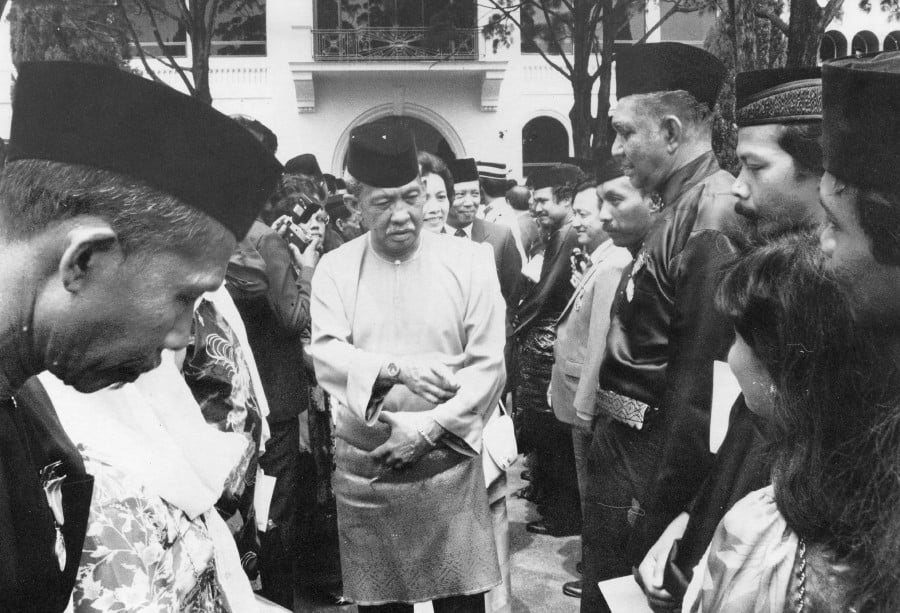
LEARNING CURVE
It was also an educational trip for Tunku Azizah as she not only learned about the ingredients used in traditional dishes and desserts, she also gained cooking tips from the womenfolk in the villages. These tips are also included in the books.
She discovered, for example, that the main ingredients for an authentic Gulai Tempoyak Pahang are cili padi and fresh turmeric. Shares Tunku Azizah: “I entered one competition and cooked the Gulai Tempoyak using only cili padi and fresh turmeric. I won first place. No one knew I’d cooked it, so no one could say that I won because I was the Tengku Puan Pahang. In most of the traditional cooking, we found out that onions weren’t used. Tamarind, too (wasn’t used). Instead, they used asam keping (sun-dried slices of fruit from the Garcinia atroviridus tree).”
And most of the traditional desserts use tepung pulut (glutinous rice flour), tepung beras (rice flour) and tepung ubi (cassava flour). “You can hardly find a traditional Malay dessert using wheat flour. Also, we don’t used refined processed sugar in the recipes. Pahang is gula kabong (palm sugar) country so we use a lot of that and Gula Melaka in the desserts.”
It took Tunku Azizah and her team a year to collect the recipes, with the last three years spent translating and editing the content. In Kuala Lipis, for example, they lost the recipes and had to go through the entire process of cooking and photographing the dishes and desserts again.
Some recipes have weird names such as Cirit Murai and Anak Lebah. Explains Tunku Azizah: “In some districts, some of the kuih look the same but have different names. Also, some ingredients differed in recipe from the other.”
In her travels all over Pahang, Tunku Azizah confides that some of the makciks told her not to share the ‘trade’ secrets behind some of the traditional desserts. This appears to be quite a common request among those who cook. “You know, the palace cooks would share recipes with me but tell me not to share them even with my sisters,” shares Tunku Azizah, adding: “I get that too when I ask a makcik for a recipe. In fact one even asked me if I was making the kuih to sell. She told me if it’s for my own consumption, I’d have to add coconut water to the batter to make it tastier. But I’m not to tell this to anyone!”
JOURNEY CONTINUES
Tunku Azizah confides that she may go around the state again for recipes that might have been missed. At last count, she already has 650 dessert recipes. “If I don’t compile these recipes, they’d be gone. There are Ramadan bazaars every year where one can get the traditional offerings. But some of these no longer taste authentic as some sellers add more flour in their kuih.”
On what she gets out of this ‘exercise’, Tunku Azizah confides that it’s the satisfaction of knowing that she’s compiling these traditional recipes for the future generation. “We’ve had a lot of fun doing this, especially going all over Pahang to look for recipes. I learnt so much from the people, about the food, cooking tips and about life itself. It’s a very warm and heart rendering experience,” she admits.
The book is priced at RM380 and all proceeds will go to the Tunku Azizah Fertility Foundation. Says Tunku Azizah: “When Bah passed away, he bequeathed me some money. I used that money to publish the books. All the proceeds from the sale of the book will go to the Foundation. I want my late father to reap the pahala (reward) from this too. And I’m satisfied that I’m able to leave something behind.”
Tunku Azizah is already planning her next book — food served in the Johor palace. She already has some 600 recipes in her collection already. “It reminds me of Coomb Hill,” she says, referring to the old palace in Johor Baru where she grew up. And no, it will not take another 10 years for her to do this one although she concedes that it might take some time as she wants it to be a step-by-step guide to cooking these dishes.
“I also want to share these recipes with my siblings. Even my brother (the Sultan of Johor) doesn’t know it,” concludes Tunku Azizah, a mischievous glint in her eyes.



